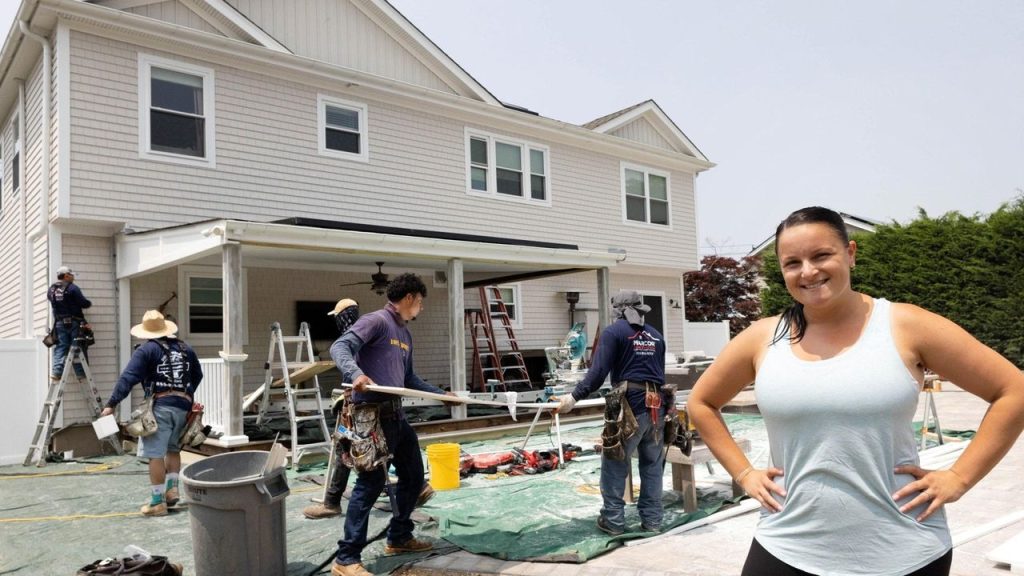Long Island homeowners looking for more space are facing a dilemma. The usual route — sell and trade up — is unattractive for many because prices are near record highs, the supply of homes on the market is severely limited, and they don’t want to give up a rock-bottom mortgage rate for a new, more expensive loan in today’s higher-rate climate.
The catch? Home improvement costs have jumped too.
The choice to stay put and remodel has gotten tougher because rates on loans to finance projects have also jumped.
At current home prices, staying put in the house people live in might be the cheapest option because of the shortage of houses on the market, said real estate broker Kevin Loiacono, who owns BrookHampton Realty in Center Moriches.
“Many people bought recently and locked in at super low interest rates,” he said. “When you get in at such a low interest rate, why leave? We’re seeing people doing renovations. People are fixing their homes up.”
U.S. homebuyers saw an average 30-year fixed mortgage rate of 6.81% for the week ending Thursday, according to Freddie Mac.
Meanwhile, about 82% of U.S. homeowners with an existing mortgage have a rate below 5%, and 62% have a rate below 4%, according to data published by Redfin last month.
That has Long Islanders asking themselves the question: Should they buy a home that better fits their needs or go through the expense and hassle of remodeling?
Potential buyers stay put
Brian and Carli Allmendinger inside their recently renovated West Islip home on Wednesday. Credit: Newsday/Steve Pfost
In 2021, Carli Allmendinger and her husband, Brian, were ready to move from their first home in West Islip to get more space. The couple, both 30, listed their two-bedroom high ranch and started searching for houses nearby but lost two bidding wars on homes they liked. One home they tried to buy in West Islip was listed at $749,000 but sold for $80,000 above the asking price.
Instead, the couple decided to hold on to a 2.9% mortgage rate they got in a refinance in 2021 and spend money instead to expand the home into a four-bedroom, four-bathroom colonial-style house.
Knowing that we could stay in the location that we wanted, and then really customize everything about our house …made it feel like that was really the right decision for us.
—Carli Allmendinger
“We didn’t want to have to settle for anything when we were paying such a high price tag,” Allmendinger said. “Knowing that we could stay in the location that we wanted, and then really customize everything about our house — from the design, to the layout, to the colors — made it feel like that was really the right decision for us.”
Allmendinger said the project cost more than she and her husband expected at the outset.
“We had a budget in mind, and we far surpassed that and that is really because of the cost of materials now and trying to get things expedited as fast as we could given that I was pregnant at the time,” she said.
Carli and Brian Allmendinger, of West Islip, decided to remodel their home instead of moving after losing out on several bidding wars in 2021. What the home looked like before (left) and after (right) their rennovations. Credit: Carli Allmendinger; Steve Pfost
The couple also needed to rent during renovations. They found a three-bedroom house in their neighborhood where rent was $4,150 a month. The Allmendingers were able to move back into the house in December while work continues on their kitchen.
“Our house is ready to have a growing family. We feel really good about that, that this could be our forever home,” Allmendinger said. “Now that we have our daughter, it just makes everything feel like we did the right thing by staying where we were.”
Higher interest rates
While local housing experts and remodelers say homeowners are more likely to stay where they are, they stopped short of predicting a remodeling boom.
“There was a huge boom during the pandemic when you had low rates,” said Mike Florio, CEO of the Long Island Builders Institute in Islandia. “I think it will be mixed going forward because you have the rate environment, but also there are people locked in. You’re not going to buy a new home … There’s work out there, but it’s not gangbusters like it was two years ago.”
U.S. spending on home remodeling is expected to decline by early 2024 after steadily rising for a decade, according to projections published by Harvard University’s Remodeling Futures Program in April. It expects spending on improvements and repairs to decline 2.8% to $458 billion for the 12 months ending April 30, 2024. It attributed the projected downturn to fewer sales of existing homes that buyers can fix up and higher interest rates for loans to fund remodeling.
The average rate for a home equity loan in the New York City metro area was 8.49% as of July 5, while the rates for a home equity line of credit averaged 9.09% locally, according to Bankrate.
The national average HELOC rate, which is 8.63%, is the highest it’s been in 22 years.
“Home equity borrowing is no longer a low-cost source of funds. It was seen that way for much of the last 15 or 20 years because rates were so low. It changed dramatically in the last 15 months or so,” said Greg McBride, chief financial analyst at Bankrate. “The impact that ultimately has is it will be a deterrent or headwind to those would be looking to tap their home equity for improvement projects. That could mean everything from scrapping the idea altogether to just reining in your goals and doing something more modest that could be funded in another way.”
Lumber drops, but few discounts
Kent Buell, who leads Kentstruction, a Medford-based general contractor, on July 1 at a Copaigue house while sheetrock work is ongoing. Credit: Debbie Egan-Chin
Higher costs for materials have also increased the costs of projects. Data on construction costs show that while the cost of lumber dropped substantially in the past year, the cost of other building materials and labor continued to rise. Nationwide, lumber costs dropped 37% in April compared with April 2022, according to Verisk, which tracks building costs for the insurance industry. But indicators tracking the cost of interior trim jumped nearly 19%, drywall increased 14% and roofing climbed 12%.
Costs in key labor categories ranged from a 6.6% increase for carpenters to 11.6% for flooring installers in April compared with the previous year, according to Verisk’s national data.
Wood went down but everything else seems to have gone up from where it used to be.
—Kent Buell, owner of Kentstruction in Medford
“Wood went down but everything else seems to have gone up from where it used to be,” said Kent Buell, owner of Kentstruction in Medford. “Windows are up crazy and you can’t even get them.”
Kentstruction, a general contractor with nine employees, is less busy now than last year, which means it has jobs booked out for the next few weeks as opposed to months, Buell said.
“A lot of people are shopping, kicking tires, asking prices, but they’re not going ahead with it,” he said.
Aging homes
More business could be on the horizon locally because of the Island’s aging housing stock. In Nassau County, 86.9% of houses were built in 1979 or earlier. In Suffolk, that figure is 70.2%. Meanwhile, only about half of homes across the U.S. are that old, according to data from the Census Bureau’s 2021 American Community Survey.
Gina Farese, operations manager at Marcor Construction in West Babylon, which does exterior remodeling on homes including the Allmendinger’s, said her company has seen steady business because homeowners often have little choice if roof repairs are needed. But other remodelers might have a tougher time getting homeowners to commit, especially as the price of projects has risen to reflect higher costs for trucking, insurance and labor, she said.
Gina Farese, operations manager at Marcor Construction, at a work site Saturday in Central Islip. Credit: Debbie Egan-Chin
“Homeowners are scared to spend money right now,” she said. “… A roof is a need. A bathroom is a want in most cases. The remodeling contractors are seeing people scale things back a bit.”
That trend has played out for both contractors and do-it-yourselfers alike.
Siding mechanic Joel Guillen works on a home in Central Islip that’s being remodeled by West Babylon-based Marcor Construction. Credit: Debbie Egan-Chin
“The size of the projects are getting a bit smaller, and it could be that the project’s being deferred or it could be that the project is being broken up into chunks,” said Ted Decker, chairman and CEO of Home Depot during a conference call with analysts in May. “Rather than do an entire room or an entire basement, you start working away at it in smaller chunks.”
One area that has remained strong is additions to homes to accommodate multiple generations of a family living under one roof.
“You see a lot of people doing additions and dormers with kids moving back home,” said Jason Kayser, managing partner at ABC Supply in Hicksville, a wholesale distributor of building materials.
‘Dream house’
John and Elizabeth Bernardes, of Mineola, outside their newly constructed home on Wednesday. Credit: Newsday/Steve Pfost
John Bernardes, 52, of Mineola, took managing the costs of a major project into his own hands. Bernardes and his wife, Elizabeth, started looking to move to a larger house near Mineola in 2015 and spent six years searching for the right property. After more than 15 years in a two-bedroom house, the family of four was looking for more room and a property with a three-car garage or space to build one. They had trouble finding the right house in their price range in Nassau County.
“We tried for years making offers that were not getting accepted because I didn’t want to overpay,” he said.
Finally, in April 2021, the couple found a 1,500-square-foot Capein a part of Mineola they loved for $550,000, which they closed on in November 2021.
But their journey to the new home was just beginning. Bernardes planned to overhaul the house into a 3,700-square-foot, five-bedroom home with the space, and curbless showers, to accommodate the couple’s parents, if they decide to move in. Only the chimney and basement would remain from the original home. He received a preliminary estimate from a contractor around the time of closing that it would take $600,000 to $700,000 to complete his vision for the project, which included a large garage behind the house.
Bernardes began working with an architect and ordered appliances and windows in early 2022 to try to get ahead of supply chain issues. But when the contractor returned, he said the project would likely cost $1.5 million, excluding the appliances Bernardes had ordered, kitchen cabinets, granite and tile.
“It was just absurd,” Bernardes said.
With other estimates still too high, Bernardes decided to take on the project.
“It was either change our plans or be the general contractor myself,” he said.
He expects the job to be finished in about a month for around $1 million, which he believes saved $250,000 to $700,000.
John and Elizabeth Bernardes, of Mineola, inside the kitchen of their newly constructed home on Wednesday. Credit: Newsday/Steve Pfost
The process involved getting multiple quotes from subcontractors for each phase — demolition, concrete, framing, electrical, plumbing to name a few—and negotiating pricing with each. Several grumbled about having to deal directly with a homeowner rather than a general contractor, Bernardes said.
“Over the past 14 months, I’ve got a lot more grays,” he said of his hair’s hue. “…I don’t regret it at all. Would I do it in today’s market conditions? Probably not. But as far as the project itself, I’m building my dream house in my dream location.”
Buy vs. build
Zahra Jafri, founder and president of Lynx Mortgage Bank in Westbury, said homeowners should carefully consider spending on renovations, particularly if they think they might move in a few years. She said she has helped several clients analyze their decision in the past year who decided selling their homes and buying elsewhere was a better option.
“Find out if what you’re going to do is going to translate into actual value,” she said. “If you needed to sell your house in a specific period of time, would you be able to recover and recoup that investment? If not, then perhaps selling and buying is a more favorable solution.”
Joanne Bechhoff, vice president of general contractor G.B. Construction and Development in Ronkonkoma, said it’s important to start working with a contractor early in process. She said homeowners often have sticker shock when they learn how much a project will cost after already spending thousands on blueprints.
Ultimately, Bechhoff said remodeling can be the right choice for people who like the location of their home.
“We always tell people, If you love your neighborhood, you’re better off adding on instead of moving to another house only to find out you’re going to have to make changes to that one,” she said.
Read the full article here







